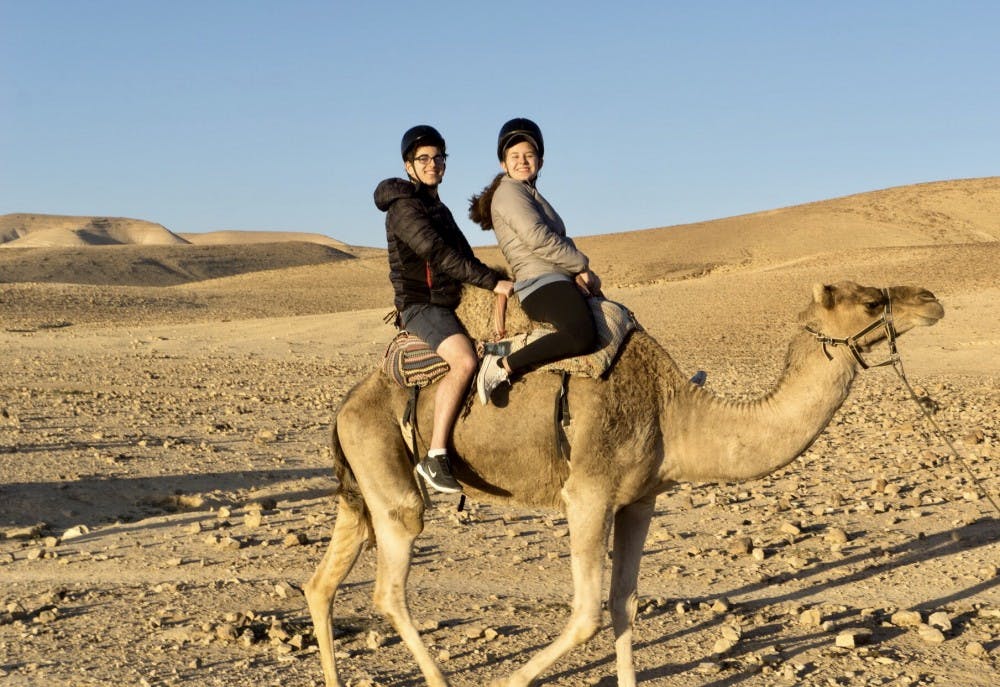
Have you had the distinct pleasure of making small talk with me recently? If so, you may recall (or you may not — what else is there to do during Intersession besides black out every night?) my joking, probably in poor taste, that going on Birthright Israel this winter converted me into an ultra-Orthodox rabbi. (Birthright is a free 10-day trip to the Holy Land for young Jewish adults around the world meant to strengthen their Jewish identities and relationship with the State and people of Israel.)
Aside from one speaker’s insistence in Jerusalem that the Jews are “undeniably the protagonists” of the Israeli-Palestinian conflict (yikes!), I didn’t feel brainwashed into accepting any sort of dogma during the trip. And to be honest, I’m not exactly sure how much visiting the land of milk and honey transformed my Jewish identity.
I felt nothing at the Western Wall except for annoyance over the separation between men and women; my greatest spiritual awakening in Israel was inventing (discovering?) with my fellow sleep-deprived friend a collective alter ego of sorts named Karla, who eats mandrake root and cow tongue to sustain her clairvoyance and big amethyst energy. And that’s the tea on that!
Perhaps it’s hard to know how much Birthright changed my Jewish identity because, despite founding a Jewish identity literary magazine this fall, I have barely done any writing about what being Jewish means to me.
As an Engagement Intern for Hopkins Hillel, I frequently take out fellow Jews on campus for coffee (hit me up), and I’ve often chatted about my Jewish identity. But I’ve been scared to write more deeply about it — to articulate it with the clarity and certainty that prose seems to require. I’m worried that I won’t have anything concrete to say or that I’ll sound corny or superficial. I’m afraid of discovering that I don’t have a decent reason for identifying as Jewish, that my only reason is that I’ve always been Jewish.
I was raised as a Conservative Jew. Before I started kindergarten, my mother prepared me for the first time I’d have to decide what to eat by myself. She told me that in the cafeteria there would not only be hamburgers but also cheeseburgers. Mixing milk and meat isn’t kosher, she said, but it’d be fine if I opted for the cheeseburger.
“Why would I do that?” I asked her. Eating a slice of cheese on top of a meat patty? Simply unfathomable to my five-year-old self. Now I am days away from turning 20, and I still have never eaten a cheeseburger.
But keeping kosher doesn’t impart meaning to my Judaism; I don’t think it really deepens my connection to my people, and it definitely doesn’t make me feel closer to God. I’m not even sure if I believe in God; I wouldn’t describe myself a religious person. (That said, The News-Letter often feels more like a religion to me than Judaism.)
I keep kosher mostly because of the sunk-cost fallacy; I’ve already invested so much into snubbing shrimp and bacon, why start eating them now?
In my opinion, however, whether someone keeps kosher shouldn’t be a benchmark of the extent to which they’re Jewish. For many, it’s a meaningful, inter-generational tradition, but for others it’s a practice that feels superficial and pointless. Keeping kosher has been a Jewish law that I observe; in another sense of the word, it’s something that others observe me doing.
I’ve been told that I look Jewish (which is kind of racist — 11 percent of Jews in the U.S. are people of color), but seeing me keep kosher is often how someone first learns that I’m Jewish. (These days, circumcision is pretty popular in the U.S.) Yet it’s not the authentic expression of my Jewish identity.
One might reasonably ask: Then what is? Firstly, it’s asking questions. Many believe that to be Jewish is to doubt, to be a critical thinker. It’s also enacting Jewish values like being kind, cherishing the importance of memory and striving to make the world a better place. It’s remembering the history of the Jewish people and celebrating our diversity.
It’s being grateful for my opportunity, after the Jewish people have faced millennia of persecution and diaspora, to travel for free to the land from which my ancestors were expelled. It’s uniting at Shabbat dinner with friends and in the streets in the wake of and in the face of anti-Semitic violence today. It’s being proud to be Jewish, whatever that means, and showcasing my pride in writing.
My most profound connection to Judaism is the Jewish community that I’ve discovered here at Hopkins. And I am thankful to have experienced Birthright with many of them — truly some of the most hilarious and vivacious people I have ever met. Among the memories from this experience that I’ll never forget are learning queer vocabulary from Tel Aviv locals (fun fact: “leerd” is hot gay man in Hebrew), watching squirrel documentaries on flights and dancing everywhere at the drop of a yarmulke. And that, I say (in the best way possible): Thank you (todah), next.





